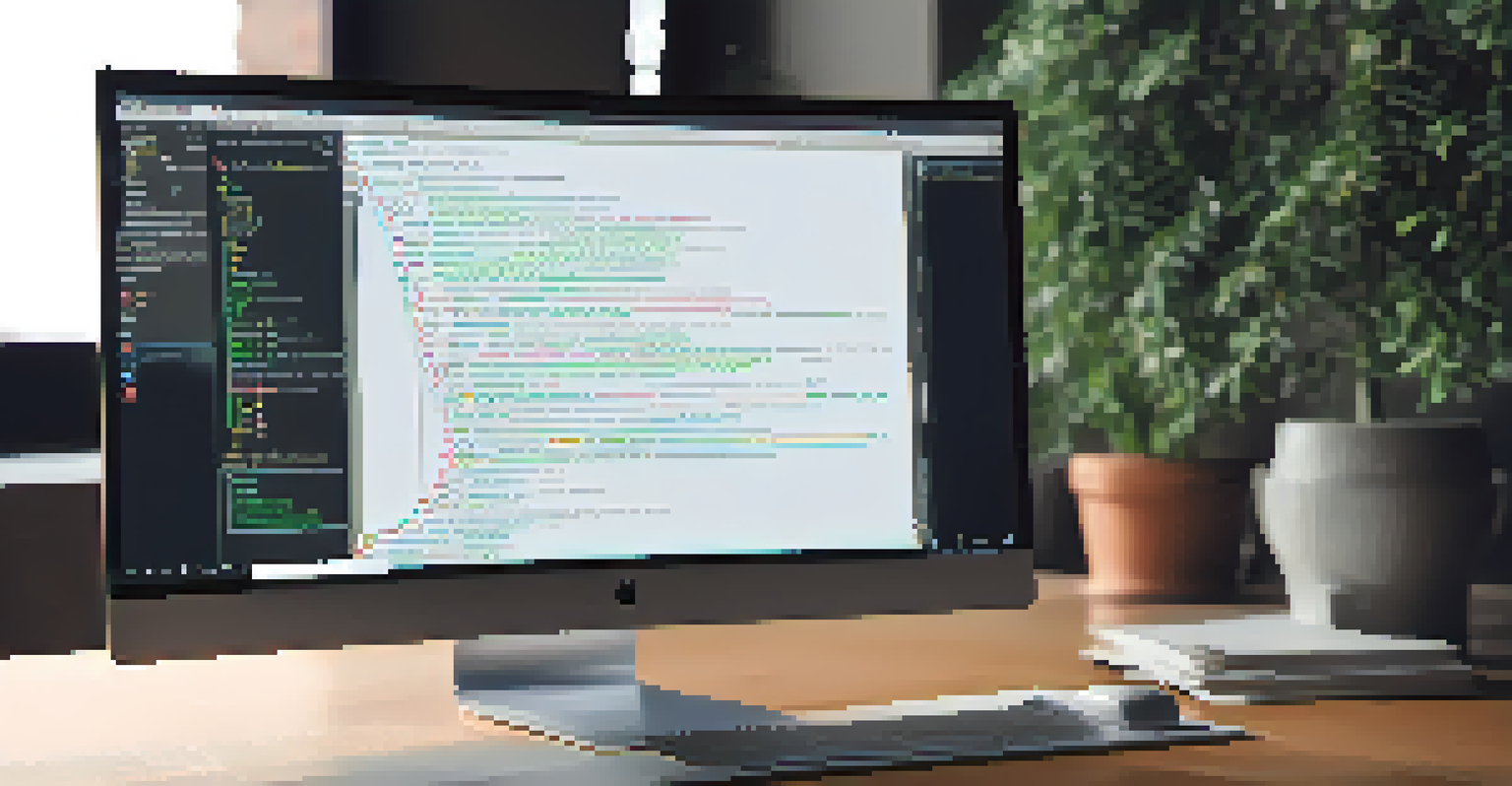Integrating Oracles: Steps for Smart Contract Developers

Understanding the Role of Oracles in Smart Contracts
Oracles serve as bridges between blockchain and real-world data, allowing smart contracts to interact with external information. Without oracles, smart contracts would be limited to the data on the blockchain, significantly reducing their utility. Think of an oracle as a trusted messenger, delivering vital updates that trigger specific actions within a smart contract.
Smart contracts are not just about code; they are about creating trust and transparency in the digital world.
For instance, if you have a smart contract that automates insurance payments, it would need access to real-world weather data. An oracle could provide that data, ensuring the contract executes correctly when conditions are met. This capability opens up a world of possibilities for decentralized applications, enabling them to respond to real-time events.
In summary, understanding oracles is crucial for any smart contract developer looking to create dynamic applications. They not only enhance functionality but also expand the scope of what can be achieved on the blockchain.
Choosing the Right Oracle Solution
Selecting the appropriate oracle solution is a vital step in the integration process. Developers can choose between centralized or decentralized oracles, each with its own advantages and drawbacks. Centralized oracles might offer speed and efficiency, but they come with a higher risk of single points of failure.

On the other hand, decentralized oracles provide increased security and reliability by aggregating data from multiple sources. For example, Chainlink is a popular decentralized oracle network that collects data from various providers, ensuring accuracy and minimizing manipulation risks. Weighing the trade-offs between speed, security, and reliability is essential when making your choice.
Oracles Enable Smart Contracts
Oracles bridge the gap between blockchain and real-world data, enhancing the functionality of smart contracts.
Ultimately, the right oracle solution will depend on the specific needs of your smart contract. Consider factors like the type of data you require, the level of security needed, and how quickly you need the information.
Setting Up Your Development Environment
Before diving into oracle integration, it's important to set up a suitable development environment. This typically involves tools like Node.js, Truffle, or Hardhat, which facilitate smart contract development and testing. Having a well-organized workspace can make the entire process smoother and more efficient.
Oracles are the key to unlocking the full potential of smart contracts by bridging the gap between blockchains and real-world data.
Additionally, ensure that you have access to the necessary libraries for integrating oracles, such as Chainlink’s or Provable’s SDKs. These libraries provide pre-built functions that simplify the integration process, allowing you to focus more on your contract’s logic rather than the underlying complexity of the oracle.
By preparing your development environment properly, you set a solid foundation for successful oracle integration, making your workflow more efficient and less prone to errors.
Writing Your Smart Contract Logic
When it comes to writing the logic for your smart contract, clarity and precision are key. Define the functions that will call the oracle and specify the data you want to retrieve. This may include setting up event listeners that trigger actions based on the oracle's data updates.
For instance, if your contract is designed to execute a trade based on market prices, you’ll need to write a function that communicates with the oracle to fetch the latest price. Ensuring that your smart contract can handle various scenarios, such as data delays or inaccuracies, is also vital for maintaining its integrity.
Choose Your Oracle Wisely
Selecting the right oracle solution is crucial and depends on the specific needs for speed, security, and data type.
Taking the time to write clear and well-structured code will pay off in the long run, reducing the chances of bugs and making it easier to update your contract as needed.
Testing Oracle Integration Thoroughly
Testing is a critical phase in the integration process, especially when dealing with oracles. You want to ensure that your smart contract responds correctly to data provided by the oracle under various scenarios. Utilizing test networks like Rinkeby or Ropsten allows you to simulate real-world conditions without the risk of losing funds.
Create test cases that include scenarios like data retrieval failures or unexpected data values. By doing this, you can verify that your contract behaves as intended, regardless of the oracle's performance. This step is crucial, as any oversight could lead to significant issues once the contract goes live.
Thorough testing not only boosts your contract's reliability but also builds trust with users who will interact with your decentralized application.
Deploying Your Smart Contract with Oracles
Once you've tested your smart contract and are confident in its functionality, it's time for deployment. Deploying a smart contract with integrated oracles requires careful attention to detail, such as ensuring that the oracle addresses and parameters are correctly configured. An incorrect setup could result in your contract failing to retrieve the necessary data.
After deployment, monitor the contract closely to ensure that the oracle is functioning as expected. Tools like Etherscan can help you track transactions and interactions with your contract. It’s also important to keep an eye on the oracle’s performance, as issues could arise from the external data source.
Regular Maintenance is Essential
Ongoing maintenance and updates of oracle-integrated contracts are vital to ensure they remain functional and secure.
Deployment is not the end of the journey; it's just the beginning. Continue to engage with the community and stay updated on best practices to optimize your smart contract’s performance.
Maintaining and Updating Oracle-Integrated Contracts
Smart contracts, especially those integrated with oracles, may require regular maintenance and updates. As external data sources evolve, you might find the need to adjust your oracle's configuration or even change the oracle provider altogether. Regularly reviewing your contract ensures it remains relevant and functional.
Consider setting up a governance mechanism that allows for updates without compromising the contract's integrity. This could involve multi-signature wallets or decentralized voting systems, giving stakeholders a voice in the contract’s evolution. Transparency in this process can help build trust among users.

In the ever-evolving world of blockchain, being proactive about maintenance ensures that your smart contracts continue to perform optimally and remain secure against potential threats.